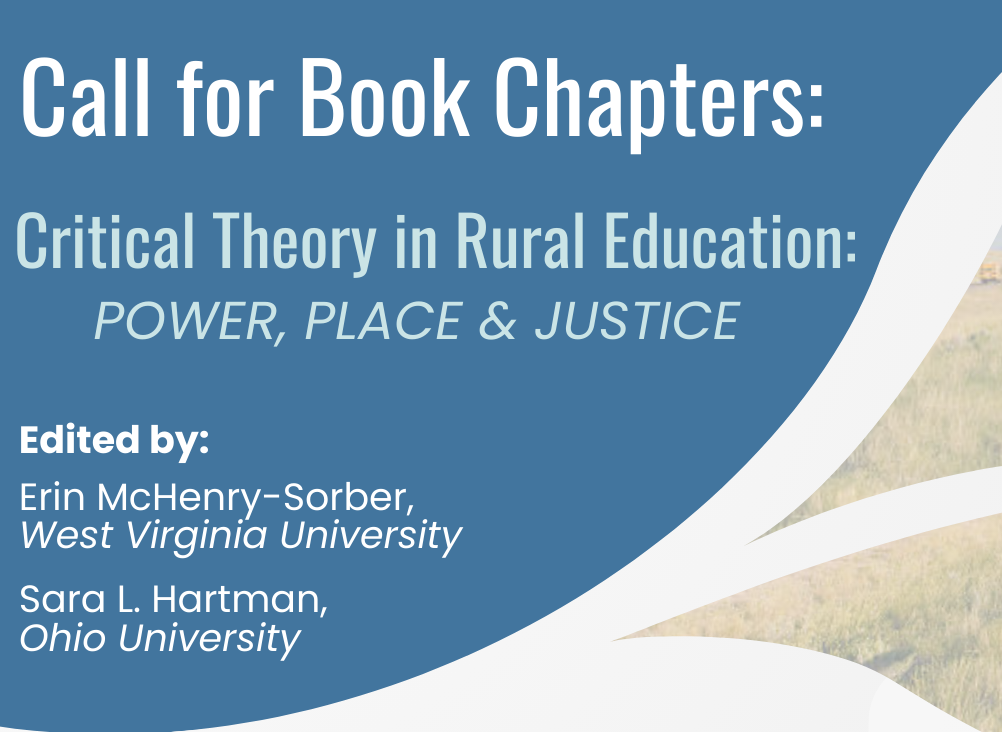Edited by:
Erin McHenry-Sorber, West Virginia University
Sara L. Hartman, Ohio University
Manuscript proposals are currently being solicited for the next book of the Rural Education and Social Justice Series (Routledge). We are seeking proposals that describe critical theoretical frameworks for creating more socially just and equitable rural education policies, partnerships, and practices. Manuscripts should describe critical frameworks that investigate the intersection of spatial equity (i.e., equity related to place) with other forms of educational equity through a lens of rural education. Chapters should describe the critical theoretical framework and/or reflections on challenges and best practices for implementation in rural education settings. This could be in the form of scholarly research, reflective essays, or narratives of practical application. We are currently not accepting stand-alone reviews of literature.
Rationale
State legislatures across the United States introduce and enact legislation banning the teaching of critical race theory, historical events, the inclusion of curricula that include “divisive” ideas, the participation of transgender athletes (or recognition of gender identities), and a host of other actions that might cause “discomfort” for community members with historically privileged identities, while simultaneously prohibiting diversity-focused professional development and training for K-12 and higher education employees. At the local level, social and political debates continue to play out in rural communities across the country in the forms of book bans curricular debates, and anti-LGBTQ+ policies. These local conflicts highlight or exacerbate educational inequities with deep historical roots, such as systemic racism, sexism, genderism, ableism, and classism, among others.
The mirroring of local social justice challenges with state-level policies designed to promote inequities occurs in tandem with unjust funding policies, environmental degradation, and inequitable distribution of resources and opportunities across places, creating and exacerbating spatially unjust outcomes, including food and medical deserts, pernicious teacher staffing shortages, and limited access to mental health resources, early intervention services, clean drinking water, and other services and opportunities vital to the sustainability of rural places and people.
As rural educators and scholars, we are charged with understanding these complex and dynamic challenges. This work requires specialized tools to interrogate and dismantle inequitable power structures, surface historical legacies of marginalization and oppression, and make sense of the imposition and adoption of grand political and economic narratives that encourage division and
undermine the fabric of community. Complicating this work is a responsibility to move beyond a deficit ideology as we grapple with complex problems of practice and knowing. Invoking the writings of Freire, and highlighting practical examples, Azano and Biddle (2019) assert the need “to challenge oppressive elements in ways that might elicit change” (p. 5). This volume seeks to highlight examples of critical theoretical frameworks that address these complicated issues through intersectional and assets-driven perspectives.
Scopes and Aims
The use of critical frameworks by rural education researchers has rapidly expanded in recent years. In this book, we hope to highlight the use of critical theoretical frameworks across three major forms: (1) interrogation of oppressive economic systems, norms, and policies that marginalize rural communities and schools; (2) a focus on place as a complex arena marginalized through its geospatial positioning and in which particular socially constructed groups are further oppressed; and, (3) a focus on identity or intersectional inquiries that highlight the social oppression and exclusion of specific rural populations. Our goal is to include book chapters that highlight the use of critical theories in framing rural education scholarship and practice.
Thus, our book will include chapters that present scholarly research, reflective essays about using critical frameworks in research, and narratives that describe challenges and best practices gleaned from implementation of a critical theoretical framework in rural education.
Author Guidelines for Proposal Preparation
- Follow APA format (7th edition)
- A 100 word abstract
- A 200 word rationale describing how your chapter will fit within the scope and aims of the book. A 200 word description of the topic that will be the focus of your chapter. 50 word/person author bios
Proposal Submission
Submit your proposal as a Microsoft Word document electronically via email to Rural.critical@gmail.com by October 30, 2024. Please do not hesitate to contact the editors with questions while preparing your proposal.
Timeline
- Decision on abstracts by December 15.
- Initial chapter submission should be no more than 6,500 words, and are due April 1, 2025.
About the Series
Rural Education and Social Justice, Routledge
This series examines rural education from a social justice lens, with a focus on complex and intersectional identities, populations, and disciplines. The books in this series take note of and seek to remedy longstanding issues of educational inequity in rural schools, and share a commitment to dismantling white supremacist, monolingual, and heteronormative legacies influencing power dynamics of rural education research, governance, policy, and practice. It also addresses the complex ecosystem of rural schools and communities, illustrating rural diversity. Timely and compelling, the Rural Education and Social Justice series includes research, theory, and foundation readings for rural education scholars and practitioners.
Series Editor: Amy Price Azano, azano@vt.edu



